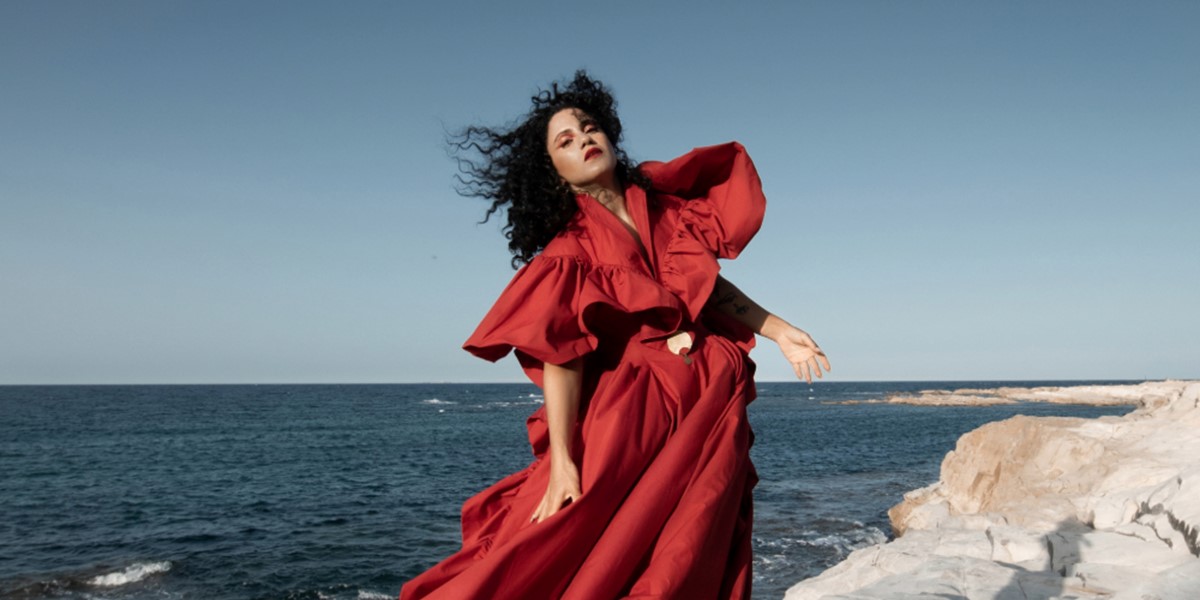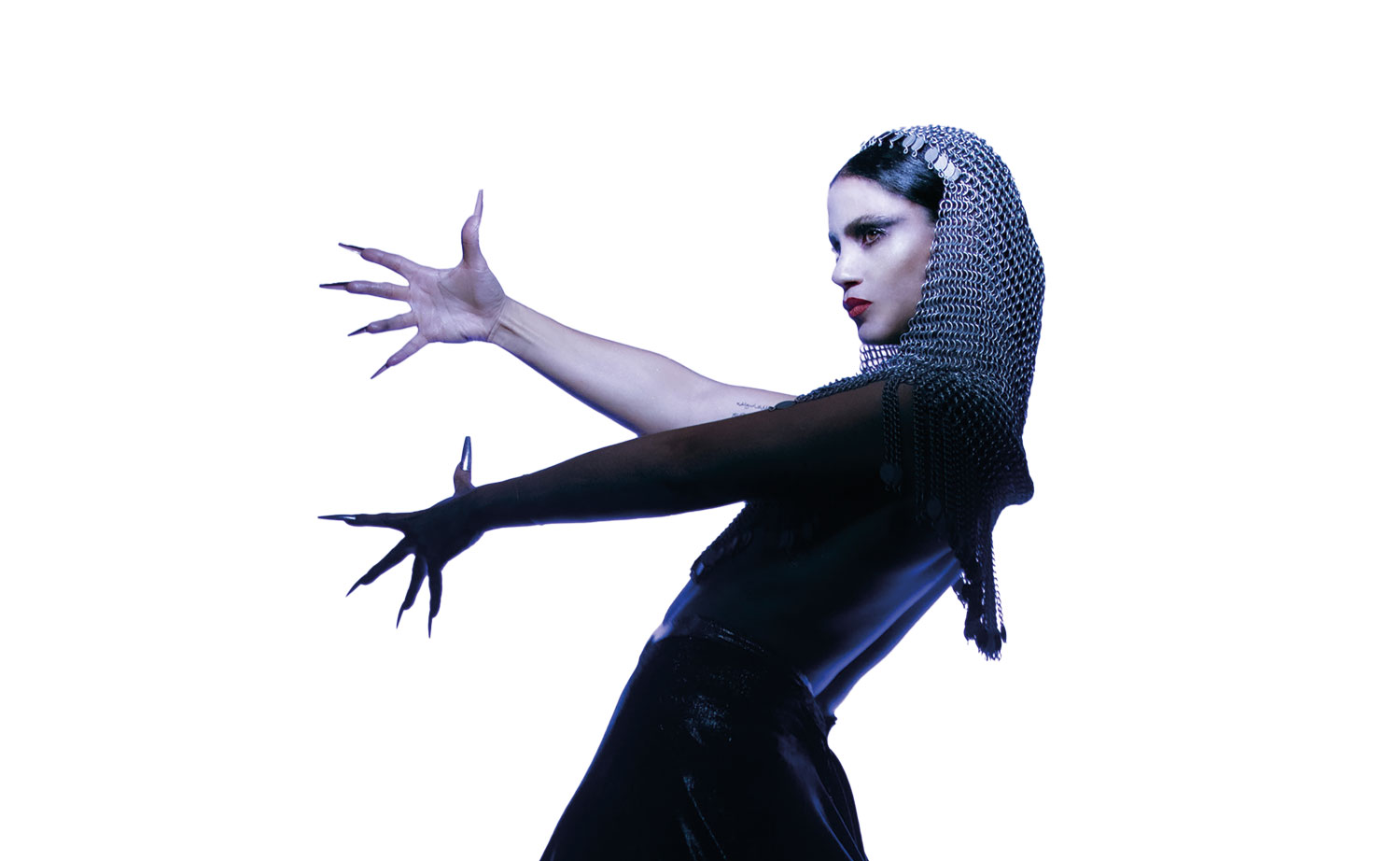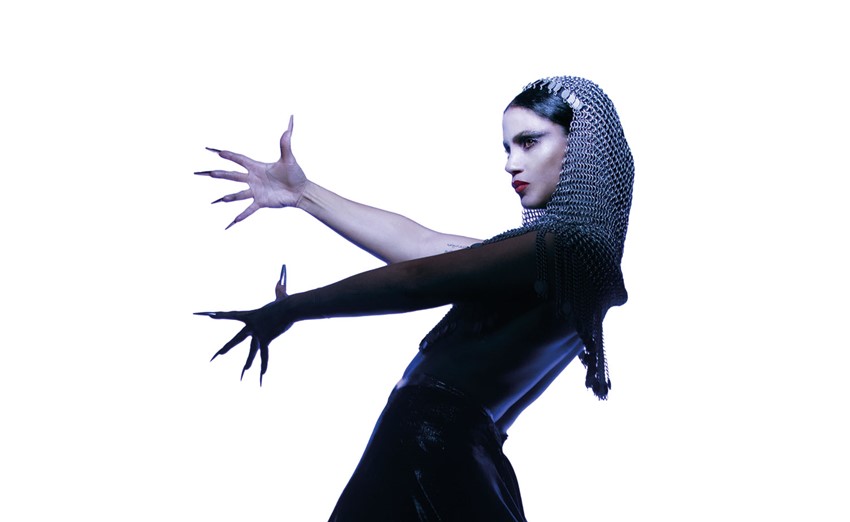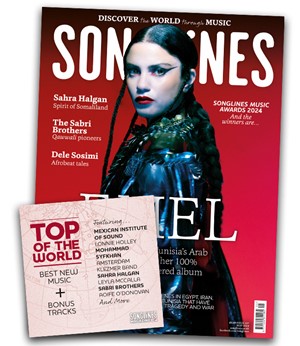Thursday, April 4, 2024
EMEL interview: “I’m not interested in that inherited feeling where women are rivals anymore”
EMEL’s latest album sees her work with a completely female team to make one of the most unapologetically forthright and adventurous albums of the year

EMEL (photo by Ryan Murad)
Emel Mathlouthi (aka EMEL) never wanted to call herself a feminist. Then she realised that she’d been one all along. “I thought, hang on, it’s not even a big deal. Women should be feminists by default, especially with everything that is going so wrong in the world right now. We need to flush these toxic patriarchal systems from everyone’s bodies.”
The Tunisian singer, composer and arranger has been making moves to do exactly that, both by challenging the norms of the male-dominated music industry and by writing protest songs that encourage a new way of being. Her guitar-led tune ‘Ya Tounes Ya Meskina’ (Poor Tunisia) and the formerly banned folk-hymnal ‘Kelmti Horra’ (My Word is Free) – which she sang to protestors on the Avenue Habib Bourguiba during Tunisia’s Arab Spring protests in 2011, and again at the 2015 Nobel Peace Prize ceremony in Oslo – contain the sort of hope that is strengthened by timing, and indeed, by musicality.
“After the 70s and 80s there was a void in protest music in the Arab world [because] of the presence of dictators,” says EMEL, a mother-of-two who has been based in New York City since 2014. “So, by the 90s the young Arabs were definitely tamed. When I started singing even Joan Baez songs in my early 20s, people were like, ‘How did you know about this? Where did you find your conscience?’”
“The problem is also that activist music is often a bit boring and simple,” she continues, FaceTiming from her bed in a Berlin hotel room, a whistlestop after playing a gig outside the pyramids in Cairo, singing her full-throated songs while weaving a cat’s cradle of rhythms on hand percussion.
“From the early days, I was just very interested in being totally free and singing in many different ways, boldly as well as subtly. It was never about just being beautiful or delivering nice melodies.”

EMEL (Amber Grey)
Welcome, then, to MRA, EMEL’s frankly astounding fourth studio album. Pronounced ‘Imra-a’ (that’s ‘woman’ in Tunisian Arabic), it’s a project that was written, conceived and produced exclusively by and with women. A miss-terwork [sic] whose 12 electro-spiritual, electrifyingly danceable tracks are variously sung and/or rapped in languages including English, Arabic and French, and duly themed to raise awareness and combat transphobia and homophobia, sexism and racism.
Unapologetically mainstream – unapologetically everything – MRA pulses with elements of rock, funk and hip-hop; with Arabic reggaeton, African trap, Brazilian batacuda and banging dancefloor-tearing drum’n’bass beats. It’s a portal to change, opened by dancing. “This record is about taking back control of our bodies, our lives, our narrative, our colour, our speech,” declares EMEL. “As an Arab woman from Africa, I was never allowed to define myself on my terms. My multilayers were ignored. For the west, I had only two ways of existing: exotic or political.”
‘I am a warrior, I am a witch, a superheroine,’ she sings, mellifluous and strident, on the anthemic ‘Nar (feat Ami Yerewolo)’. ‘I am a soldier, I am a fighter, a bullet…’ Watch her video for lead single ‘Lose My Mind’, a banger about fear and liberation lent smoky-voiced ballast by Swedish-Iraqi rapper Nayomi, and it’s easy to believe her.
Clad in flowing red, her nails talon-like, her black plaits flailing, EMEL is an otherworldly force, a queenly apparition not unlike the great NYC multi-hyphenate artist/activist Diamanda Galás, an ancient-to-future vision bent on rallying like-minds, transcending boundaries, unleashing and enacting change.
This morning, however, she’s getting her rest, midway through a tour that has taken in Abu Dhabi and the archaeology-rich Altındağ in Turkey. In March she played WOMADelaide in Australia, a very different artist from the guitar-strumming, laptop-and-violin-accompanied protest singer of her last visit in 2014.
Nevertheless, while MRA is buoyed by a team of underrepresented, overly-talented women, including Malian rapper Ami Yerewolo (on ‘Nar’), Nigerian MC Eva Alordiah (on ‘IDHA’), Brazilian DJ-producer Lyzza and Ukraine’s 2024 Eurovision entry, alyona alyona, the musicians that are touring with her are male. It’s not ideal, she says. But it is how it is: “Facts are facts. Men tend to hire men. It’s hard to find female musicians who’ll tour.”
“But we don’t have to be apologetic for wanting to support women and especially, to trust each other. I’m not interested in that inherited feeling where women are rivals anymore.” Her eyes flash. “I want to change the system from within. I’ll be doing a residency in May in Paris and we will have a female drummer, female sound engineer, lighting designer, tour manager, photographer, publicist, you name it.”
If she’s angrier now – indeed, if all women are angrier now – it’s because she’s tired of waiting. Change was promised and didn’t come; not really. “I keep thinking of that comment by Ruth Bader Ginsburg,” says EMEL, namechecking the late associate justice of the Supreme Court of the United States.
“She was asked when she thought there would be enough women on the Supreme Court. She replied, ‘when there are nine of them [taking all nine seats],’ and people were shocked. She said, but it’s been men all these years and no one thinks that is extreme!”
A pause. “We’re still labouring under this system that was created by men. 99% of the tracks on my albums” – Ensen (2017), the remix album Ensenity (2018), Everywhere We Looked Was Burning (2019) and The Tunis Diaries (2020) – “were done with male producers. People were always like, ah your music is so empowering, who produced it? I’d be like, er, well…”
“I figured that if I don’t insist on having female producers, I’ll just end up working with another man.” When her previous record label “tried to push me to do things I didn’t want to do,” she duly set up her own label, Little Human. “I wanted to create a new accessible sound that would get the message out as widely as possible. I was listening to an extensive playlist of women DJs and reckoned some had to be producers. I rented a house in Normandy, France and invited a few of them along.”
One of the first to arrive was Netherlands-based Brazilian DJ Lyzza, whose eagerness to experiment dovetailed with EMEL’s art-pop aesthetic: “Lyzza is young and was eager to try anything: sampling old Tunisian and Algerian songs, or mixing north African rhythms with trap, hip-hop and electronic music. She got me to sing faster, to divide my Arabic flow. I had fun playing around with the music of my culture.”
EMEL grew up in Tunis, the daughter of an academic Marxist father who was “imprisoned for his opinions” during the 1990s regime of Zine al-Abidine Ben Ali, then fired from his job (‘IDHA’, a dramatic song about the world’s lack of empathy, is dedicated to him). She read Arabic literature alongside books by Dickens, Dostoevsky and Mark Twain, and listened to a vinyl collection that favoured classical music and Tunisian-Jewish music from between 1900-1950 (“When people were really free: Habiba Msika had her own car before she was shot by her male lover; Louisa Tounsia had a song called ‘Empowering Women’”).
Her mother, an elementary school teacher, instilled a drive, a wish for self-betterment, in the young EMEL that – in tandem with a preternatural ability for singing, acting and songwriting – would stand her in good stead. She went on to front a heavy metal band called Idiom while (“sort of”) studying engineering at university: “I love the lyricism, drama and intensity of metal and its correlations with classical music. Just listen to Vivaldi’s Four Seasons! It’s got a total metal feel.”
She says she came late to Arabic music, which she’d previously associated with clichés involving “the diva standing on stage who just has to sing beautifully and follow the rules set by the men who compose for her. I had been searching for something more freeing, which was why metal spoke to me. For years I was proud of being the only woman wherever I went.” She sighs. “The conditioning was bad.”
One day a bandmate played her Joan Baez’ version of ‘The Boxer’, and her world tilted. She began writing protest songs, including the aforementioned viral hit ‘Kelmti Horra’, written with Tunisian poet Amine Al Ghozzi, who provided the lyrics. With these new songs she was mindful that a) she was being monitored, b) opportunities were limited and c) the songs’ sentiments had seen them banned on Tunisian TV and radio. In 2007 she slipped out of the country for a new life in France. She was on tour in Tunisia for the brief blooming of 2010’s Arab Spring: “I took the mic onstage and said, ‘we have to support these people because they are just asking for work and dignity.’”
“Being in France empowered me for sure,” she says. “But it wasn’t until I got to New York that I really started trusting myself as a producer, an artistic director. New York gives you wings; there’s no end to what you can try and experiment with there. I love that you mention Diamanda Galás,” she continues, “because I’m not the gentle pretty little thing that comes on and does the exotic Arabic belly-dancing.”
“I’ve always felt that I had to win people’s respect through my music. And with MRA I’ve created a sisterhood through banger music that will bring healing to everyone and break the cycle of male domination in a fun, non-negative way.”
She flashes a grin. “It’s a new cool universe.”
This article originally appeared in the May 2024 issue of Songlines. Never miss an issue – subscribe to Songlines today

